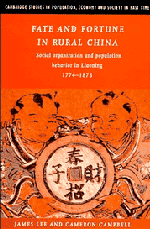Book contents
- Frontmatter
- Contents
- List of figures
- List of maps
- List of tables
- Acknowledgements
- PART 1 DAOYI VILLAGE
- PART 2 THE LIAONING DEMOGRAPHIC SYSTEM
- PART 3 HOUSEHOLD ORGANIZATION AND POPULATION BEHAVIOR
- PART 4 BANNER ORGANIZATION AND POPULATION BEHAVIOR
- EPILOGUE: PROSPECTS, IMPLICATIONS, AND COMPARISONS
- Appendices
- Glossary
- References
- Index
- Cambridge Studies in Population, Economy and Society in Past Time
PART 3 - HOUSEHOLD ORGANIZATION AND POPULATION BEHAVIOR
Published online by Cambridge University Press: 20 October 2009
- Frontmatter
- Contents
- List of figures
- List of maps
- List of tables
- Acknowledgements
- PART 1 DAOYI VILLAGE
- PART 2 THE LIAONING DEMOGRAPHIC SYSTEM
- PART 3 HOUSEHOLD ORGANIZATION AND POPULATION BEHAVIOR
- PART 4 BANNER ORGANIZATION AND POPULATION BEHAVIOR
- EPILOGUE: PROSPECTS, IMPLICATIONS, AND COMPARISONS
- Appendices
- Glossary
- References
- Index
- Cambridge Studies in Population, Economy and Society in Past Time
Summary
A large family is a happy family (quanjia fu bu yile hu)
common Chinese proverbThe banner household, called hu in Han Chinese or boigon in Manchu Chinese, was defined by common residence and common consumption. Household members lived together, ate together, and farmed together. Moreover, like most Chinese families, they did so largely free from government interference. While the banner administration could influence household behavior through the approval of household division, households were otherwise free to order their domestic affairs as they preferred. The household was therefore fundamentally a private, if regulated, form of organization.
It was also a universal institution. Everyone lived in a household no matter if it was a solitary hut or a large compound of many courtyards and families. Many Chinese scholars and scholars of China accordingly described the household as the paramount social institution in Chinese society (Baker 1979). Confucius went so far as to describe the ideal Chinese state as analogous to the Chinese family, and the ideal head of state as analogous to the head of a household.
This was equally true in rural banner communities such as Daoyi and surrounding villages. The Qing state preferred large families to ensure an adequate supply of family labor to work the family farm and to pay the family taxes. The banner administration accordingly encouraged the formation of such large households and bolstered household hierarchy by recognizing a primogenitary system of household headship. In consequence, the household domestic cycle and the individual life cycle were inextricably bound together. Individual position within the household depended largely on parental position.
- Type
- Chapter
- Information
- Fate and Fortune in Rural ChinaSocial Organization and Population Behavior in Liaoning 1774–1873, pp. 103 - 104Publisher: Cambridge University PressPrint publication year: 1997



